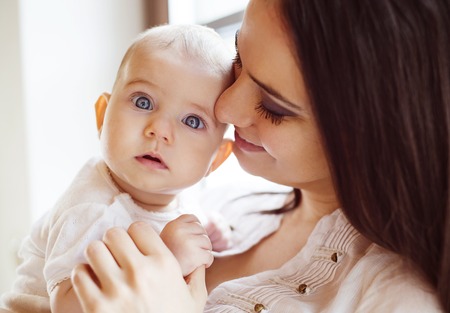1. Why Talking to Your Baby Matters
For UK parents, engaging in regular conversation with your baby is more than just a bonding activity—it’s a cornerstone of early childhood development. Extensive research shows that babies who are spoken to frequently from birth develop stronger language skills, better emotional intelligence, and enhanced cognitive abilities. In the UK, where diverse accents and dialects form part of our rich cultural tapestry, even everyday chit-chat at home helps babies tune in to sounds and speech patterns unique to their local community. Whether you’re reading a favourite picture book in a London flat or narrating your day during a stroll through a Manchester park, these small moments of dialogue play a huge role in laying the foundations for your child’s future learning and social confidence.
2. British Parents’ Everyday Challenges and Opportunities
Raising a baby in the UK comes with its own unique blend of joys and hurdles. From juggling work commitments to braving the unpredictable British weather, parents often find themselves pulled in many directions. One common concern is how to make time for meaningful interaction with their little one amid daily routines. Whether you’re navigating the school run in Manchester drizzle or queuing at the supermarket in London, every moment presents an opportunity to engage your baby in conversation.
It’s easy to underestimate how much language learning can happen during everyday scenarios. British parents may worry about not having enough time for structured “talk time,” but research shows that natural, spontaneous chat throughout the day is just as effective. Below is a table highlighting some typical daily situations UK parents face and practical tips for weaving language into them:
Scenario |
Opportunity for Language |
Example Phrases |
|---|---|---|
School Run or Nursery Drop-Off |
Narrate your journey, describe surroundings, label vehicles and people. | “Look at that big red bus! Shall we count the cars?” “It’s chilly today, let’s put on your hat.” |
Supermarket Shop |
Name foods, talk about colours and shapes, involve your child in choices. | “Can you spot the green apples?” “Let’s find some milk for our tea.” |
Bath Time |
Describe actions, sing songs, introduce new words for toys and water play. | “Splash splash goes the duck!” “Let’s wash your little toes.” |
Pushing the Pram in the Park |
Point out nature, comment on weather, mimic animal sounds. | “Listen to the birds singing.” “The grass feels wet after the rain.” |
Cuddle Time Before Bed |
Read stories aloud, discuss pictures, ask simple questions. | “Who can you see on this page?” “Shall we say goodnight to the teddy?” |
No matter where you are across Britain—be it bustling city streets or quiet countryside lanes—everyday moments offer rich opportunities to foster your baby’s language development. By consciously talking through these scenarios using familiar UK phrases and references, you help your child feel connected both to you and their local culture.

3. Practical Ways to Build Conversation Into British Routines
Integrating meaningful conversations with your baby into everyday life doesn’t require extra time or fancy resources – it’s all about making the most of daily routines. Here are some easy and realistic ways UK parents can start building a language-rich environment from day one.
Buggy Walks in the Park
Whether you’re strolling through your local National Trust gardens or just popping down to the high street, buggy walks are perfect for chatting with your baby. Describe what you see: “Look at those red buses!” or “Can you hear the ducks on the pond?” Narrate your journey, point out dogs, birds, or even the sound of rain on your umbrella – all these snippets add up to rich language exposure.
Nappy Changes as Chat Time
Changing nappies is a regular part of parenting, so why not make it a learning moment? While you’re at the changing table, talk through what you’re doing: “Let’s get you into a fresh nappy,” or “That’s a lovely clean vest.” Singing classic British nursery rhymes like “Twinkle, Twinkle Little Star” or “Wind the Bobbin Up” can also create positive associations with language and routine.
Story Time Before Bed
Bedtime stories are a beloved UK tradition that foster both bonding and early literacy. Even tiny babies love to listen to your voice and look at colourful board books. Choose age-appropriate classics like “Guess How Much I Love You” or “Peepo!” and don’t worry if you end up reading the same book every night – repetition helps babies learn new words and rhythms. Make story time interactive by asking questions (“Where’s the teddy?”), pointing at pictures, or even making up stories about your day.
Conversation in Everyday Moments
It’s not just set activities that count – everyday moments like popping to Tesco, waiting for the bus, or preparing dinner are ideal times for chit-chat. Comment on what you’re buying, name fruits and vegetables, or talk about who you might see when out and about. These real-world examples help build vocabulary that’s grounded in daily British life.
Keep It Natural and Fun
The key is to keep conversation natural – you don’t need to put on a performance. Speak in your usual voice, use everyday words, and enjoy these little exchanges as opportunities to connect with your child while supporting their development.
4. Using Local Resources for Language Development
When it comes to supporting your baby’s language development in the UK, there is a wealth of local resources designed specifically for parents and young children. Making the most of these services not only enhances your baby’s early communication skills but also connects you with a supportive community of fellow parents.
Children’s Libraries: More Than Just Books
UK children’s libraries are vibrant hubs that offer more than just access to picture books and storytime sessions. Many branches host free or low-cost activities such as rhyme time, baby book clubs, and storytelling workshops. These sessions are run by trained staff who understand the importance of interactive language play. Attending regularly helps expose your baby to new words, songs, and social experiences in a welcoming environment.
NHS Guidance: Trusted Advice at Your Fingertips
The NHS provides up-to-date advice on speech and language milestones through its website and health visitors. Parents can use NHS-approved leaflets, videos, and apps like “Start for Life” to get practical tips tailored to each stage of development. Health visitors are available for one-on-one consultations and often run drop-in clinics where you can discuss any concerns about your child’s progress.
Community Baby Groups: Building Connections
Local community centres across the UK offer baby groups that focus on singing, chatting, and playing together. These groups—often organised by Sure Start Children’s Centres or local councils—create safe spaces for babies to interact while parents swap advice. Joining a baby group is an excellent way to boost your confidence in talking with your little one while building friendships that can support you throughout your parenting journey.
Summary of Key UK Resources
| Resource Type | Main Benefits | How to Access |
|---|---|---|
| Childrens Libraries | Storytimes, rhyme sessions, free book lending | Check local council websites for timetables |
| NHS Guidance | Expert tips, milestone checklists, health visitor support | NHS website or ask your GP/health visitor |
| Community Baby Groups | Peer support, social play, language-rich activities | Contact Sure Start Centres or local community halls |
Why Local Resources Matter
Tapping into these UK-specific resources means you’re never alone on your parenting journey. Whether you’re looking for reliable information or a friendly space to practice early conversation with your baby, these services offer invaluable support. Don’t hesitate to explore what’s available in your area—you’ll find both expert advice and a sense of belonging as you nurture your child’s language skills.
5. Recognising Milestones and When to Seek Support
Understanding your baby’s speech and language development is crucial for UK parents who want to give their child the best possible start. While every child develops at their own pace, there are typical milestones you can look out for as your little one grows. For example, by 6 months, most babies in the UK will be cooing and making a variety of sounds. By their first birthday, many are able to say simple words like “mama” or “dada” with meaning. At 18 months, you might notice your child using up to 20 words and beginning to put two words together by age two.
Knowing What’s Typical in the UK
It’s important to remember that these milestones are general guidelines, not strict deadlines. However, being familiar with them helps you spot if your child might need extra support. In the UK, health visitors routinely check on your baby’s development during appointments at key ages (such as the 9-12 month and 2-2½ year reviews), so make the most of these opportunities to ask questions.
When Should You Be Concerned?
If your child isn’t babbling by 12 months, isn’t using any words by 18 months, or doesn’t seem to understand simple instructions by age two, it may be worth seeking advice. Other signs include lack of eye contact, very limited gestures (like pointing or waving), or losing skills they once had.
Where to Get Support in the UK
The NHS offers excellent resources for parents concerned about speech and language delays. Start by speaking with your health visitor or GP; they can refer you to a local Speech and Language Therapist if needed. Charities such as I CAN and the National Literacy Trust also provide helpful information and support. Remember, early intervention can make a significant difference—don’t hesitate to seek help if you have concerns about your child’s communication development.
6. Top Recommended Books, Toys, and Programmes
If you’re looking to create a language-rich environment for your baby at home, choosing the right resources can make all the difference. Here’s a curated list of British-favourite books, toys, and programmes that support early language learning and are beloved by UK parents.
Books: Cultivating a Love for Words
“Dear Zoo” by Rod Campbell
This classic lift-the-flap book is a staple on many British bookshelves. The repetitive structure and engaging animal sounds encourage babies to join in and predict what comes next.
“The Gruffalo” by Julia Donaldson
With its rhyming text and memorable characters, this modern classic is perfect for reading aloud. It helps little ones develop vocabulary and listening skills while enjoying a uniquely British tale.
“Peepo!” by Janet & Allan Ahlberg
Set in wartime Britain, “Peepo!” provides not only language stimulation but also an introduction to British heritage through detailed illustrations and simple, rhythmic storytelling.
Toys: Interactive Language Boosters
Lamaze Freddie the Firefly
A popular sensory toy in the UK, Freddie the Firefly offers various textures, patterns, and hidden squeakers—perfect for prompting talk about colours, shapes, and sounds during playtime.
LeapFrog My Pal Scout or Violet
These plush interactive puppies personalise songs and phrases with your child’s name. They’re ideal for introducing new words and encouraging responsive conversation from an early age.
Programmes: Engaging British Media
CBeebies “Bedtime Stories”
The BBC’s CBeebies channel is adored by UK families for its high-quality children’s content. Their “Bedtime Stories” series features familiar British celebrities reading favourite children’s books—helpful for winding down while reinforcing language skills.
“Something Special” with Mr Tumble
This beloved programme uses Makaton sign language alongside spoken English, making it inclusive and excellent for supporting communication development—especially popular among UK families with younger children.
Final Shopping Tips
When choosing resources, look for those that invite interaction—think lift-the-flap books, talking plush toys, or shows that encourage joining in. Opting for products created or recommended within the UK ensures cultural relevance and often a familiar accent for your child. Investing in these tried-and-tested favourites not only supports your baby’s language journey but also connects them with cherished British traditions.

